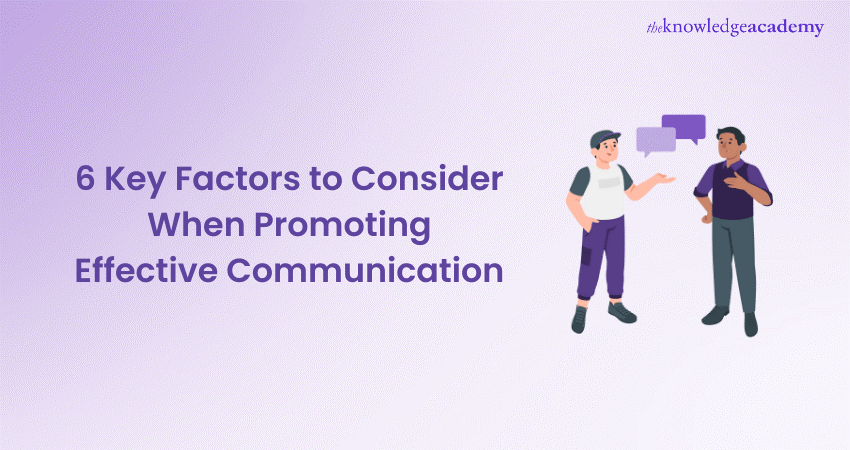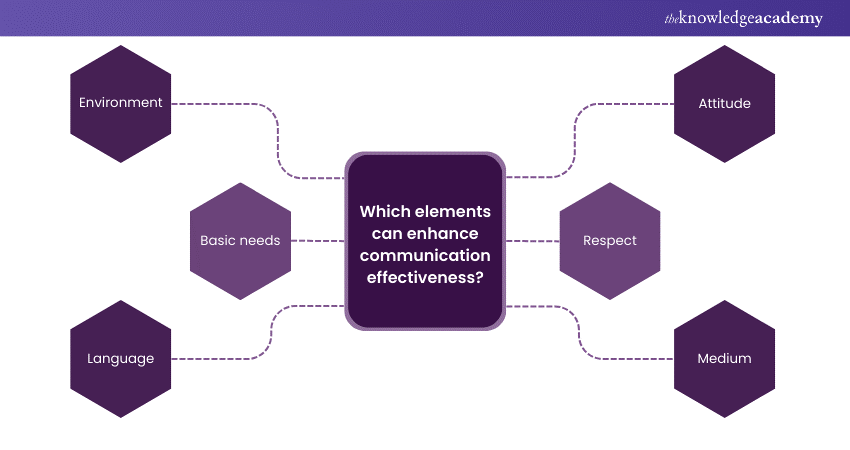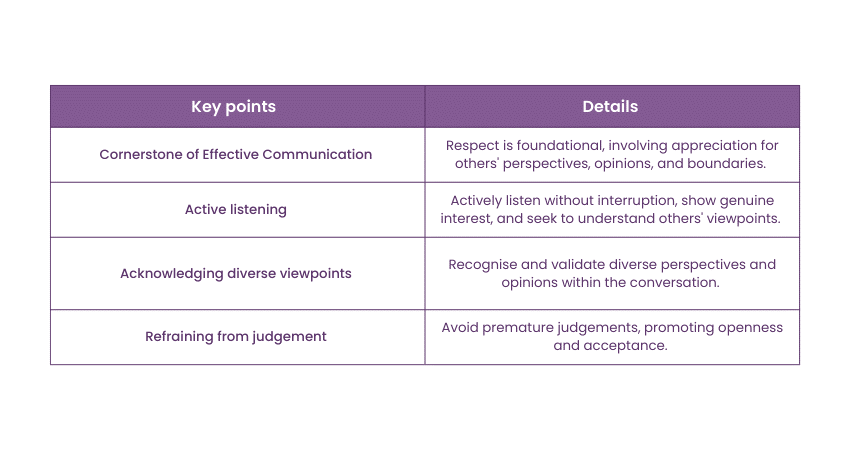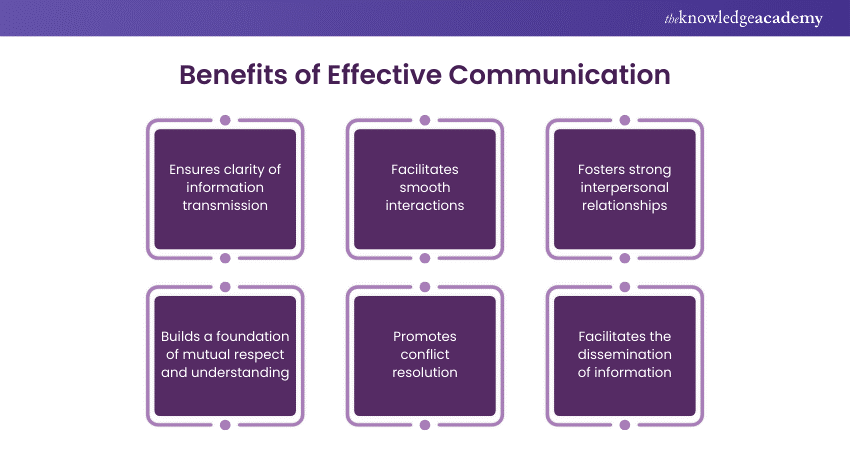We may not have the course you’re looking for. If you enquire or give us a call on +0800 780004 and speak to our training experts, we may still be able to help with your training requirements.
Training Outcomes Within Your Budget!
We ensure quality, budget-alignment, and timely delivery by our expert instructors.

As you know, Effective Communication is paramount for success in both personal and professional endeavours. Understanding the intricacies of communication and mastering key factors that enhance its effectiveness is essential for individuals and organisations alike. By examining the key Factors to Consider When Promoting Effective Communication, you can acquire valuable insights into improving your skills.
To enhance teamwork or improve communication, this blog can familiarise you with the Factors to Consider When Promoting Effective Communication. Join us as we unravel the intricacies of Effective Communication and uncover strategies for enhancing communication effectiveness.
Table of Contents
1) What is an Effective Communication?
2) Key factors for promoting Effective Communication
a) Environment
b) Basic needs
c) Language
d) Attitude
e) Respect
f) Medium
3) Why is Effective Communication essential?
4) Conclusion
What is an Effective Communication?
Effective Communication refers to the ability to convey messages clearly and efficiently. It specifically involves the exchange of information in a comprehensible and impactful way. Moreover, its procedure encompasses various elements, including clarity of expression, active listening, empathy and feedback.
Ultimately, Effective Communication is essential for success in both personal and professional contexts. It can serve as a cornerstone for building strong connections and driving positive outcomes.
Key Factors for Promoting Effective Communication
Apart from recognising the significance of impactful communication, it is crucial to delve into the key factors for promoting Effective Communication. Successful communication acts as the foundation for nurturing robust relationships, promoting teamwork, and attaining common objectives.
Through mastery of the following essential elements, individuals can elevate their communication abilities and forge meaningful bonds with others. Let’s explore each of them in detail:

Environment
The context in which communication occurs can significantly impact its efficacy. Factors such as noise levels, distractions, and physical surroundings can either facilitate or hinder communication. Thus, creating a conducive environment, free from distractions and conducive to open dialogue is essential.
Basic needs
Understanding and addressing basic human needs is fundamental to Effective Communication. Factors like food, water, rest, and safety can significantly impact an individual's ability to engage in meaningful communication. Moreover, communicators can create a foundation for productive interactions by ensuring that these needs are met.
Language
Essentially, language serves as the primary communication tool and choosing the right words conveys messages more accurately and effectively. Thus, it is essential to consider the audience's language proficiency and cultural background. In addition, communication style plays a crucial role in selecting language and vocabulary.
Attitude
Attitude plays a vital role in communication, influencing both the sender's message and the receiver's interpretation. Moreover, a positive attitude, characterised by openness, empathy, and respect, fosters trust and understanding between communicators. Conversely, negative attitudes such as defensiveness or hostility can hinder communication and lead to misunderstandings.
Respect
Respect is a cornerstone of Effective Communication since it encompasses appreciation for others' perspectives, opinions, and boundaries. Mostly, active listening and acknowledging diverse viewpoints can foster Effective Communication. Additionally, refraining from judgment fosters mutual trust and encourages open communication.

Medium
Choosing the appropriate communication medium is essential for effectively conveying messages. Whether it's face-to-face conversations, emails, phone calls, or video conferences, each medium has its advantages and limitations. Selecting the most suitable medium depends on the nature of the message, audience preferences and the desired level of engagement.
Unlock the Power of Persuasion: Join our Negotiation Skills Training today!
Why is Effective Communication essential?
Effective Communication is indispensable in every facet of life. Let’s now talk about the reasons that make it essential:

a) Effective Communication ensures clarity of information transmission by minimising misunderstandings and misinterpretations.
b) It facilitates smooth interactions and decision-making processes by conveying ideas, thoughts and intentions accurately.
c) It fosters strong interpersonal relationships by cultivating empathy, trust and rapport.
d) Open and honest communication builds a foundation of mutual respect and understanding, leading to enhanced teamwork and cooperation.
e) Effective Communication promotes conflict resolution by encouraging open dialogue, active listening and finding common ground.
f) It drives organisational success by facilitating the dissemination of information, alignment of objectives and coordination of efforts across teams.
Overall, Effective Communication is essential for building relationships. It can also drive success in both personal and professional spheres.
Empower your team for excellence by investing in our Call Centre Training - join us now!
Conclusion
In conclusion, Effective Communication is essential for fostering collaboration and achieving success. By understanding the Factors to Consider When Promoting Effective Communication, individuals can navigate interpersonal interactions more effectively. Along with this, they can achieve their goals with greater ease.
Master the art of executive communication with our Executive Communication Training today!
Frequently Asked Questions

You can opt for face-to-face communication whenever possible in noisy environments. Utilise non-verbal cues like gestures and facial expressions to enhance understanding. Consider using headphones or finding quieter spaces for important discussions.

When faced with a language barrier, you can simplify your language and avoid jargon. Additionally, consider using translation tools or seeking the assistance of a bilingual colleague to facilitate communication.

The Knowledge Academy takes global learning to new heights, offering over 30,000 online courses across 490+ locations in 220 countries. This expansive reach ensures accessibility and convenience for learners worldwide.
Alongside our diverse Online Course Catalogue, encompassing 17 major categories, we go the extra mile by providing a plethora of free educational Online Resources like News updates, Blogs, videos, webinars, and interview questions. Tailoring learning experiences further, professionals can maximise value with customisable Course Bundles of TKA.

The Knowledge Academy’s Knowledge Pass, a prepaid voucher, adds another layer of flexibility, allowing course bookings over a 12-month period. Join us on a journey where education knows no bounds.

The Knowledge Academy offers various Communication Skills Training, including the Public Speaking Course, Assertiveness Skills Training, and Negotiation Skills Training. These courses cater to different skill levels, providing comprehensive insights into Delegation Skills for Effective Leadership.
Our Business Skills Blogs cover a range of topics related to Effective Delegation, offering valuable resources, best practices, and industry insights. Whether you are a beginner or looking to advance your Business skills, The Knowledge Academy's diverse courses and informative blogs have got you covered.
Upcoming Business Skills Resources Batches & Dates
Date
 Public Speaking Course
Public Speaking Course
Fri 28th Feb 2025
Fri 11th Apr 2025
Fri 27th Jun 2025
Fri 22nd Aug 2025
Fri 24th Oct 2025
Fri 28th Nov 2025







 Top Rated Course
Top Rated Course



 If you wish to make any changes to your course, please
If you wish to make any changes to your course, please


